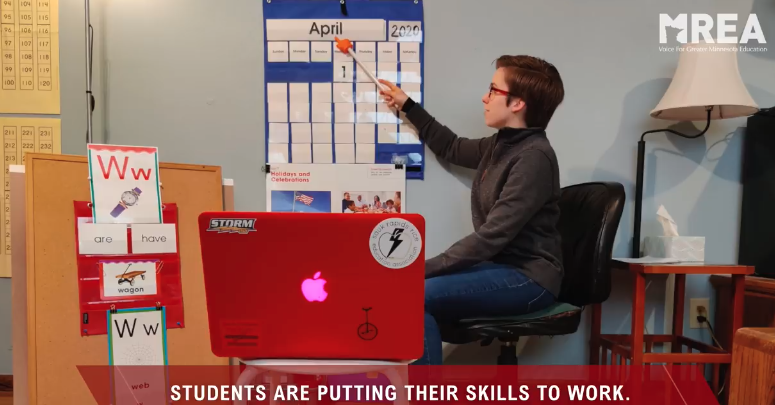In distance learning, teachers have answered the call and are working hard to serve students, but not without issues. Their greatest concerns center around students and their well-being, according to a survey of Minnesota teachers conducted in early April by Minnesota State University-Moorhead.
Over 1,000 teachers from across the state reported feeling their teaching practice and personal lives are highly disrupted by COVID-19 and distance learning. The differences between size of school, age of teachers, experience, grade level, gender is slight when it comes to the disruption of life and teaching as all groups feel disrupted.
Despite the disruption, teachers remain hopeful. Comments included:
- “We will make it work!”
- “Unique situation for all, do your best and make it work.”
See video of distance learning across Greater Minnesota.
Balancing
Teachers overwhelmingly regard the situation as manageable but stressful. Comments included:
- “It has been by far the biggest challenge I have faced in my years as an educator.”
- “I can manage but with lots of stress and concern.”
Teachers’ comments regarding managing teaching from home fell into four more themes:
- Managing their own children’s education while teaching at home is difficult.
- Needing to rely on support system (spouse, partner, daycare)
- Struggling to maintain work-life balance (daily life schedule)
- Having inadequate broadband access from home
“The expectation of teaching and caring for my own children (priority #1) and teaching my students (obviously another top priority). It gets complicated fast, but we are doing the best we can.”
District Support
Teachers for the most part reported support from their administration and district.
- 92% of responding teachers expressed great confidence or some confidence in district leadership.
- 77% were satisfied with district training prior to beginning distance teaching.
The primary recommendations from the authors of the report for those in school leadership, from school boards, district administration to building and teacher leaders include:
- Honor these feelings
- Be kind to each other
- Realize connecting with each other on a personal level continues to be important every day in every situation
- Find intentional ways to show how much teachers and staff are valued as they work in uncertain times.
Concerns for Students, Families
The well-being of students and their families was the top concern of teachers.
Teachers reported concerns for “The mental, behavioral and emotional health of my students” and how to “keep my students healthy emotionally and physically.”
The survey revealed that teacher-student interactions, student-student interactions and relationship building key to learning and well-being and have been dramatically decreased with distance learning. One teacher put the concern this way:
“Relationships are everything and it is much more difficult to reach as many students in that way through online learning.”
Learning
Teachers raised concerns about learning achieved during distance learning. Some students have failed to show up for online class. Even those who do show up may not be productive.
Teachers need to rely upon parents, to a large extent, to help ensure attendance and participation in the teaching and learning process. However, parents are feeling overwhelmed themselves.
Special education teachers noted that parents still had expectations that they would meet the individualized instructional components of a child’s program, but the logistical considerations compromised the ability to deliver those individualized needs. In addition, there was a sense that special education children would regress at an even greater rate than many regular education students, similar to the idea of student regression for those with little to no parental support at home.
About the Survey
Minnesota State University Moorhead (MSUM) conducted the survey in the first two weeks of April 2020. The following educational leadership faculty led the survey: Dr. Julie Swaggert, Dr. Ximena Suarez-Sousa, Dr. Boyd Bradbury, Dr. Mike Coquyt, and Dr. Chris Mills. A total of 1,064 teachers responded to the Swaggert Instructional Practice Under Crisis (SIPUC) anonymous questionnaire via Qualtrics.
View the Survey Data Summary Analysis
……………………………..
Stay Connected
Stay apprised of resources and news on COVID-19 for schools at: MREAvoice.org/covid19





